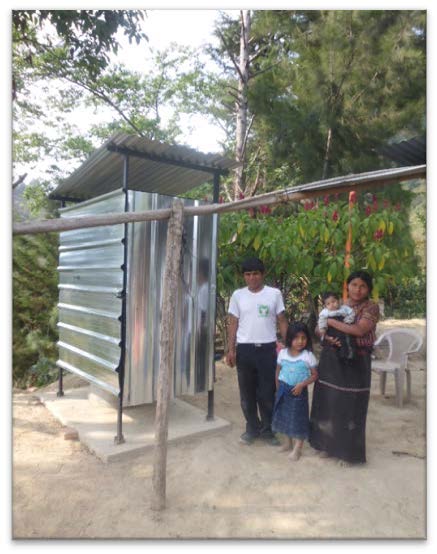
DRY OUTHOUSES AND HYGIENE EDUCATION

Compostable Outhouses are a real win-win-win. First, sanitation is greatly improved from traditional methods. Also, these outhouses not only stop the far too frequent pollution of water sources, they also provide a systematic way to improve the soil.
Compostable Outhouses are a real win-win-win. First, sanitation is greatly improved from traditional methods. Also, these outhouses not only stop the far too frequent pollution of water sources, they also provide a systematic way to improve the soil.
These improved sanitation services together with hygiene education will provide an urgently needed hand up to improve the welfare of children and entire families in rural Guatemalan settings.
In Guatemala, 45% of the population lives in rural areas. 40.4% are poor and 13.3% extremely poor. Despite overall improvements in the Human Development Index (HDI) rated by the United Nations, the advances in health have shown only a reduction of 0.4% in child mortality in the final five years of the last decade. 30 children per 1000 births die before reaching year one and 42/1000 before the age of five Gastrointestinal infections are the main cause of mortality.
The people themselves will help to build these new compostable outhouses. There is a storage container in the ground below. Ashes and dirt will be combined into the container as needed forming a product suitable for improving the overall soil health of their cultivations together with other organic and environmentally appropriate farming practices.
The overall goal is to reduce the impact of preventable gastrointestinal diseases in families, mortally affected by diarrhea and dehydration from cholera and typhoid; and to improve the nutrition levels of children and pregnant women. The installation of 400 dry latrines for an equal number of families will help greatly. Also, the training of community volunteers will provide an understanding of construction and associated maintenance. Expanded hygiene education to marginalized rural families in rural Atitlan areas of Guatemala will be highly important as well.
Carrying out the training, installation of outhouses and related hygiene education will cost $177 per family. The intended reach is 200 families at a total cost of $35,400. That is, one dry latrine outhouse properly installed per family of approximately 6 people (1,200 people benefitted) and 100 volunteers trained and with educational materials available to develop their own trainings in their communities. The results will provide a long-term solution to an extremely serious problem among the very poor indigenous Mayan ancestry people in the rural communities in the Atitlan Lake in Guatemala.